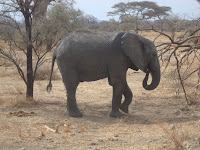Over
the past few weeks I have been reading World
without End by Ken Follett. It is a historical fiction that takes place in
medieval times, and as I have read it I have come across several similarities
between medieval England and present-day Tanzania:
· Male
domination. In 14th century England, the man’s role was to provide
income and to make all family decisions. The woman’s role was to raise
children, cook, clean, and obey her husband (e.g. the women got the short end
of the stick). Today, Tanzania is no different. It is rare to find an
independent woman here and even rarer to find a man who will cook or clean. It
is frowned upon by all members of society for a man to do domestic chores
because it takes away from his masculinity. Men have control over all money matters, even if his wife
produces her own income by selling crops. If she needs money to buy groceries,
she must ask her husband to give it to her. There are also no female doctors
here, which is interesting because one of the main characters in World without End is a female who
aspires to be a doctor, but can’t because society won’t allow it.
· Medical
care provided by churches. Medieval churches served as hospitals for the sick
and injured, and the “doctors” were priests and priors who, despite their
training, had no understanding of the human body. For example, blood-letting
and purging were used for decades before people realized these “treatments”
only worsened conditions. Of course Tanzanian doctors don’t do these kinds of
things, but most hospitals here are sponsored by churches. However, it is not
uncommon for a Tanzanian doctor to refuse to tell a patient their diagnosis if
it is a bad one. For example, here is a story I actually heard from an HIV+
woman: she went to the clinic to get tested for HIV because she had suspicions
that she had contracted the disease. The first doctor she went to refused to
test her because he didn’t want to break the bad news to her if she tested
positive. She convinced the next doctor she saw to test her, but he only agreed
because she claimed she would not ask him for the results. She returned to his
office the day after her test and asked him for the results, and he refused to
tell her her status. Although he would not tell her, she said, “I already know
I have HIV,” and he said, “How do you know?” She replied, “I can see it in your
eyes.” She was right. However, that was years ago and today this woman, Mama
Betty, is living healthy and positively despite her HIV.
· Modes
of disease transmittance. Just like people believed the European black plague
was transmitted through looking at someone who was infected, this is a myth
about HIV transmittance in Tanzania as well. It is one of several in fact.
Another myth is that it is spread through witchcraft, another common belief
between Tanzania and medieval England. Witchcraft is believed to be at the root
of many problems here, and I have even met Tanzanians with college educations
who believe that witchcraft is real. I have also been informed that (just like
in medieval times) “witches/wizards” may be hunted down and killed so they will
stop casting spells (like the HIV spell?).
· Illegal
homosexuality. Not surprisingly, homosexuality was illegal in medieval England
(although it was common among monks and nuns, according to Follett) and is
illegal in Tanzania. The reason this does not surprise me is because,
unfortunately, 50% of the population (women) still don’t have the rights they
deserve, so it seems highly unlikely that a much smaller population of people
who may be viewed as “unnatural” would have the rights they deserve. People
here LOVE Obama. I have to wonder, do they love him because he’s black? or
because of his support of gay marriage?
These
are simply observations. I am not making any implications, although it does
seem that some of these cultural ideals may serve as barriers for development.
Next
week, I’m off to teach bio-intensive agriculture in the villages! (Bet you didn’t
know I know how to farm! It’s amazing what you can learn in a few weeks…)



